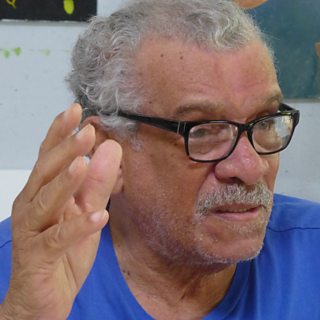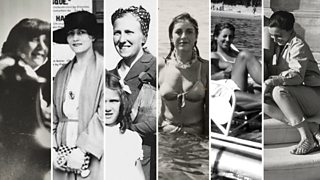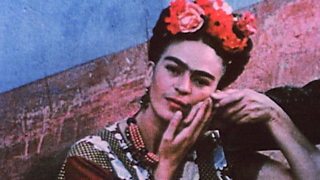Derek Walcott: A Fortunate Traveller
Nobel Prize-winning poet Derek Walcott turned 84 this year. BBC producer Tim Dee writes about how Radio 4 and Walcott's former student Glyn Maxwell were invited to join the birthday celebrations in the Caribbean.

In the last few years Derek Walcott's birthday has been marked on his home island of St Lucia with various events, official and otherwise, parties and lectures. The poet, who won the Nobel Prize in Literature in 1992, was 84 in January.
He invited BBC Radio 4 to eavesdrop on some of the fun. He also opened up the studio room to the side of his house where, under his painted portraits of poet friends, family scenes and tropical landscapes, he spoke of his life and read some of his poems to Glyn Maxwell for Derek Walcott: A Fortunate Traveller.
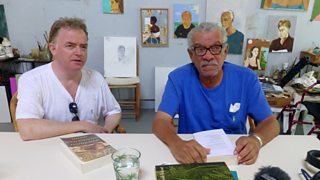
Glyn is a poet and was one of Derek’s first students at Boston University. The master and the apprentice became friends and Glyn has repaid his poetic debt by editing a thick, new selection of his teacher’s work that has been published this year in both the USA and the UK.
Early copies of the hardback were much in evidence at Derek’s seaside house at Gros Islet, but he was keen, though saddened, to point out that the book is unlikely to be widely available on St Lucia itself since the island's only bookshop is no more. The difficulties of being an artist of any kind in the Caribbean, and indeed the hardship for most of life itself for most of its people, was one of the themes of the conversation.
St Lucia is a beautiful tropical island. The interior is mountainous with thick vegetation climbing every slope and painted in such a metallic green that the hills glare at you under the hot blue sky; the coast is exquisitely indented with sandy bays and beaches; wherever you look, there are hummingbirds sipping at blossoming creepers; rum and other sugary treats abound.
But the lushness of growth, the catamarans, and the tourists (Amy Winehouse found some solace here towards the end of her short life) are deceptive. Walcott has written at length over many years and in many poems of the tyranny of that same lushness, the way its green refulgence cancels any human history in the Caribbean.
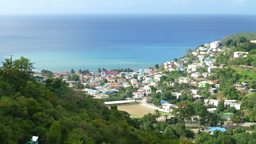
Every day is a bit like the Garden of Eden the first day after the fall of man. In part this is just nature at work with plenty of rain and sunshine, but in part this is also because of the history of what human outsiders at different times have done to the islands’ peoples: genocide (the extinction of the Amerindian population), slavery, exploitation.
Now in his later years he has come back to the only place he can think of as his home"
This inheritance is both troubled and disabling for many. Walcott shares with another Nobel Laureate, V. S. Naipaul, a deep reluctance at being identified as a Caribbean Writer and has worked and written all around the world, but now in his later years he has come back to the only place he can think of as his home.
On the day of Derek’s birthday we too shipped on a catamaran down the western seaboard of St Lucia. We were plied with dangerous orange-coloured drinks. I saw my first ever flying fish skittering across the waves ahead of the boat.
And at a hotel lunch I listened to the staff and assembled guests sing happy birthday and watched as cheeky lesser Antillean bullfinches started nibbling at the iced likeness of Derek’s face on his waiting birthday cake.
The talk with him throughout our stay was as rich and suggestive. The Globe theatre in London has just staged a version of Omeros, Walcott’s epic remaking of Homer’s Odyssey, and he came from St Lucia to work on the production.
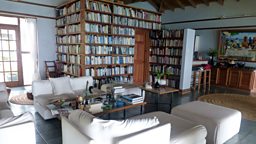
Now back home again, the ageing poet, whose knees thanks to his tropical existence must be the best known of any writer, is not likely to make many more odysseys of his own. As he sat in shorts and looked out over the Caribbean sea and half a dozen fishing pirogues making their way home, there were tears for his close friend Seamus Heaney.
Then came the unlikely consolation of English poetry. Just when I’d begun to put my tape recorder away and was preparing to leave, a poem rose unbidden. Memorised ages ago but kept warm in Walcott’s heart and meaningful to him even under the tropical sun, was the soft English elegiac poem Fare Well by Walter de la Mare.
Looking at the sea, his permanent subject, and the fishing boats (they feature, sixty years apart, in the first and last of the poems in the new book) he spoke de la Mare’s lines about traveller’s joy entwined with a harvest hedgerow and the injunction to ‘look thy last on all things lovely’. It was hard not to share some tears.
Tim Dee has been a radio producer for twenty-five years. He makes poetry programmes and radio drama and is based in Bristol.
Derek Walcott: A Fortunate Traveller is on BBC Radio 4 at 16:27 on Sunday 13 July.
Listen on Radio 4
-
![]()
Derek Walcott: A Fortunate Traveller
Glyn Maxwell meets the Nobel Laureate poet Derek Walcott at his home on the Caribbean island of St Lucia on his 84th birthday.
-
![]()
Books at the BBC
Discover the best of books and authors from BBC Arts
More from BBC Arts
-
![]()
Picasso’s ex-factor
Who are the six women who shaped his life and work?
-
![]()
Quiz: Picasso or pixel?
Can you separate the AI fakes from genuine paintings by Pablo Picasso?
-
![]()
Frida: Fiery, fierce and passionate
The extraordinary life of Mexican artist Frida Kahlo, in her own words
-
![]()
Proms 2023: The best bits
From Yuja Wang to Northern Soul, handpicked stand-out moments from this year's Proms
